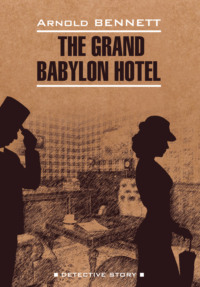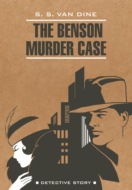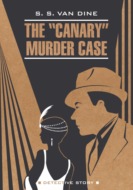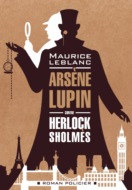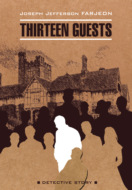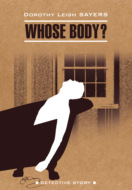Kitobni o'qish: «Отель «Гранд Вавилон» / The Grand Babylon hotel»
© КАРО, 2020
Все права защищены
Chapter One. The millionaire and the waiter
‘YES, sir?’
Jules, the celebrated head waiter of the Grand Babylon, was bending formally towards the alert, middle-aged man who had just entered the smoking-room and dropped into a basket-chair in the corner by the conservatory. It was 7.45 on a particularly sultry June night, and dinner was about to be served at the Grand Babylon. Men of all sizes, ages, and nationalities, but every one alike arrayed in faultless evening dress, were dotted about the large, dim apartment. A faint odour of flowers came from the conservatory, and the tinkle of a fountain. The waiters, commanded by Jules, moved softly across the thick Oriental rugs, balancing their trays with the dexterity of jugglers, and receiving and executing orders with that air of profound importance of which only really first-class waiters have the secret. The atmosphere was an atmosphere of serenity and repose, characteristic of the Grand Babylon. It seemed impossible that anything could occur to mar the peaceful, aristocratic monotony of existence in that perfectly-managed establishment. Yet on that night was to happen the mightiest upheaval that the Grand Babylon had ever known.
‘Yes, sir?’ repeated Jules, and this time there was a shade of august disapproval in his voice: it was not usual for him to have to address a customer twice.
‘Oh!’ said the alert, middle-aged man, looking up at length. Beautifully ignorant of the identity of the great Jules, he allowed his grey eyes to twinkle as he caught sight of the expression on the waiter’s face. ‘Bring me an Angel Kiss.’
‘Pardon, sir?’
‘Bring me an Angel Kiss, and be good enough to lose no time.’
‘If it’s an American drink, I fear we don’t keep it, sir.’ The voice of Jules fell icily distinct, and several men glanced round uneasily, as if to deprecate the slightest disturbance of their calm. The appearance of the person to whom Jules was speaking, however, reassured them somewhat, for he had all the look of that expert, the travelled Englishman, who can differentiate between one hotel and another by instinct, and who knows at once where he may make a fuss with propriety, and where it is advisable to behave exactly as at the club. The Grand Babylon was a hotel in whose smoking-room one behaved as though one was at one’s club.
‘I didn’t suppose you did keep it, but you can mix it, I guess, even in this hotel.’
‘This isn’t an American hotel, sir.’ The calculated insolence of the words was cleverly masked beneath an accent of humble submission.
The alert, middle-aged man sat up straight, and gazed placidly at Jules, who was pulling his famous red side-whiskers.
‘Get a liqueur glass,’ he said, half curtly and half with good-humoured tolerance, ‘pour into it equal quantities of maraschino, cream, and crème de menthe. Don’t stir it; don’t shake it. Bring it to me. And, I say, tell the bar-tender—’
‘Bar-tender, sir?’
‘Tell the bar-tender to make a note of the recipe, as I shall probably want an Angel Kiss every evening before dinner so long as this weather lasts.’
‘I will send the drink to you, sir,’ said Jules distantly. That was his parting shot, by which he indicated that he was not as other waiters are, and that any person who treated him with disrespect did so at his own peril.
A few minutes later, while the alert, middle-aged man was tasting the Angel Kiss, Jules sat in conclave with Miss Spencer, who had charge of the bureau of the Grand Babylon. This bureau was a fairly large chamber, with two sliding glass partitions which overlooked the entrance-hall and the smoking-room. Only a small portion of the clerical work of the great hotel was performed there. The place served chiefly as the lair of Miss Spencer, who was as well known and as important as Jules himself. Most modern hotels have a male clerk to superintend the bureau. But the Grand Babylon went its own way. Miss Spencer had been bureau clerk almost since the Grand Babylon had first raised its massive chimneys to heaven, and she remained in her place despite the vagaries of other hotels. Always admirably dressed in plain black silk, with a small diamond brooch, immaculate wrist-bands, and frizzed yellow hair, she looked now just as she had looked an indefinite number of years ago. Her age—none knew it, save herself and perhaps one other, and none cared. The gracious and alluring contours of her figure were irreproachable; and in the evenings she was a useful ornament of which any hotel might be innocently proud. Her knowledge of Bradshaw, of steamship services, and the programmes of theatres and music-halls was unrivalled; yet she never travelled, she never went to a theatre or a music-hall. She seemed to spend the whole of her life in that official lair of hers, imparting information to guests, telephoning to the various departments, or engaged in intimate conversations with her special friends on the staff, as at present.
‘Who’s Number 107?’ Jules asked this black-robed lady.
Miss Spencer examined her ledgers.
‘Mr Theodore Racksole, New York.’
‘I thought he must be a New Yorker,’ said Jules, after a brief, significant pause, ‘but he talks as good English as you or me. Says he wants an “Angel Kiss”—maraschino and cream, if you please—every night. I’ll see he doesn’t stop here too long.’
Miss Spencer smiled grimly in response. The notion of referring to Theodore Racksole as a ‘New Yorker’ appealed to her sense of humour, a sense in which she was not entirely deficient. She knew, of course, and she knew that Jules knew, that this Theodore Racksole must be the unique and only Theodore Racksole, the third richest man in the United States, and therefore probably in the world. Nevertheless she ranged herself at once on the side of Jules.
Just as there was only one Racksole, so there was only one Jules, and Miss Spencer instinctively shared the latter’s indignation at the spectacle of any person whatsoever, millionaire or Emperor, presuming to demand an ‘Angel Kiss’, that unrespectable concoction of maraschino and cream, within the precincts of the Grand Babylon. In the world of hotels it was currently stated that, next to the proprietor, there were three gods at the Grand Babylon—Jules, the head waiter, Miss Spencer, and, most powerful of all, Rocco, the renowned chef, who earned two thousand a year, and had a chalet on the Lake of Lucerne. All the great hotels in Northumberland Avenue and on the Thames Embankment had tried to get Rocco away from the Grand Babylon, but without success. Rocco was well aware that even he could rise no higher than the maître d’hôtel of the Grand Babylon, which, though it never advertised itself, and didn’t belong to a limited company, stood an easy first among the hotels of Europe—first in expensiveness, first in exclusiveness, first in that mysterious quality known as ‘style’.
Situated on the Embankment, the Grand Babylon, despite its noble proportions, was somewhat dwarfed by several colossal neighbours. It had but three hundred and fifty rooms, whereas there are two hotels within a quarter of a mile with six hundred and four hundred rooms respectively. On the other hand, the Grand Babylon was the only hotel in London with a genuine separate entrance for Royal visitors constantly in use. The Grand Babylon counted that day wasted on which it did not entertain, at the lowest, a German prince or the Maharajah of some Indian State. When Felix Babylon—after whom, and not with any reference to London’s nickname, the hotel was christened—when Felix Babylon founded the hotel in 1869 he had set himself to cater for Royalty, and that was the secret of his triumphant eminence.
The son of a rich Swiss hotel proprietor and financier, he had contrived to established a connection with the officials of several European Courts, and he had not spared money in that respect. Sundry kings and not a few princesses called him Felix, and spoke familiarly of the hotel as ‘Felix’s’; and Felix had found that this was very good for trade. The Grand Babylon was managed accordingly. The ‘note’ of its policy was discretion, always discretion, and quietude, simplicity, remoteness. The place was like a palace incognito. There was no gold sign over the roof, not even an explanatory word at the entrance. You walked down a small side street off the Strand, you saw a plain brown building in front of you, with two mahogany swing doors, and an official behind each; the doors opened noiselessly; you entered; you were in Felix’s. If you meant to be a guest, you, or your courier, gave your card to Miss Spencer. Upon no consideration did you ask for the tariff. It was not good form to mention prices at the Grand Babylon; the prices were enormous, but you never mentioned them. At the conclusion of your stay a bill was presented, brief and void of dry details, and you paid it without a word. You met with a stately civility, that was all. No one had originally asked you to come; no one expressed the hope that you would come again. The Grand Babylon was far above such manoeuvres; it defied competition by ignoring it; and consequently was nearly always full during the season.
If there was one thing more than another that annoyed the Grand Babylon—put its back up, so to speak—it was to be compared with, or to be mistaken for, an American hotel. The Grand Babylon was resolutely opposed to American methods of eating, drinking, and lodging—but especially American methods of drinking. The resentment of Jules, on being requested to supply Mr Theodore Racksole with an Angel Kiss, will therefore be appreciated.
‘Anybody with Mr Theodore Racksole?’ asked Jules, continuing his conversation with Miss Spencer. He put a scornful stress on every syllable of the guest’s name.
‘Miss Racksole—she’s in No. 111.’
Jules paused, and stroked his left whisker as it lay on his gleaming white collar.
‘She’s where?’ he queried, with a peculiar emphasis.
‘No. 111. I couldn’t help it. There was no other room with a bathroom and dressing-room on that floor.’ Miss Spencer’s voice had an appealing tone of excuse.
‘Why didn’t you tell Mr Theodore Racksole and Miss Racksole that we were unable to accommodate them?’
‘Because Babs was within hearing.’
Only three people in the wide world ever dreamt of applying to Mr Felix Babylon the playful but mean abbreviation—Babs: those three were Jules, Miss Spencer, and Rocco. Jules had invented it. No one but he would have had either the wit or the audacity to do so.
‘You’d better see that Miss Racksole changes her room to-night,’ Jules said after another pause. ‘Leave it to me: I’ll fix it. Au revoir! It’s three minutes to eight. I shall take charge of the dining-room myself to-night.’
And Jules departed, rubbing his fine white hands slowly and meditatively. It was a trick of his, to rub his hands with a strange, roundabout motion, and the action denoted that some unusual excitement was in the air.
At eight o’clock precisely dinner was served in the immense salle à manger, that chaste yet splendid apartment of white and gold. At a small table near one of the windows a young lady sat alone. Her frocks said Paris, but her face unmistakably said New York. It was a self-possessed and bewitching face, the face of a woman thoroughly accustomed to doing exactly what she liked, when she liked, how she liked: the face of a woman who had taught hundreds of gilded young men the true art of fetching and carrying, and who, by twenty years or so of parental spoiling, had come to regard herself as the feminine equivalent of the Tsar of All the Russias. Such women are only made in America, and they only come to their full bloom in Europe, which they imagine to be a continent created by Providence for their diversion.
The young lady by the window glanced disapprovingly at the menu card. Then she looked round the dining-room, and, while admiring the diners, decided that the room itself was rather small and plain. Then she gazed through the open window, and told herself that though the Thames by twilight was passable enough, it was by no means level with the Hudson, on whose shores her father had a hundred thousand dollar country cottage. Then she returned to the menu, and with a pursing of lovely lips said that there appeared to be nothing to eat.
‘Sorry to keep you waiting, Nella.’ It was Mr Racksole, the intrepid millionaire who had dared to order an Angel Kiss in the smoke-room of the Grand Babylon. Nella—her proper name was Helen—smiled at her parent cautiously, reserving to herself the right to scold if she should feel so inclined.
‘You always are late, father,’ she said.
‘Only on a holiday,’ he added. ‘What is there to eat?’
‘Nothing.’
‘Then let’s have it. I’m hungry. I’m never so hungry as when I’m being seriously idle.’
‘Consommé Britannia,’ she began to read out from the menu, ‘Saumon d’Ecosse, Sauce Genoise, Aspics de Homard. Oh, heavens! Who wants these horrid messes on a night like this?’
‘But, Nella, this is the best cooking in Europe,’ he protested.
‘Say, father,’ she said, with seeming irrelevance, ‘had you forgotten it’s my birthday to-morrow?’
‘Have I ever forgotten your birthday, oh, most costly daughter?’
‘On the whole you’ve been a most satisfactory dad,’ she answered sweetly, ‘and to reward you I’ll be content this year with the cheapest birthday treat you ever gave me. Only I’ll have it to-night.’
‘Well,’ he said, with the long-suffering patience, the readiness for any surprise, of a parent whom Nella had thoroughly trained, ‘what is it?’
‘It’s this. Let’s have filleted steak and a bottle of Bass for dinner to-night. It will be simply exquisite. I shall love it.’
‘But my dear Nella,’ he exclaimed, ‘steak and beer at Felix’s! It’s impossible! Moreover, young women still under twenty-three cannot be permitted to drink Bass.’
‘I said steak and Bass, and as for being twenty-three, shall be going in twenty-four to-morrow.’
Miss Racksole set her small white teeth.
There was a gentle cough. Jules stood over them. It must have been out of a pure spirit of adventure that he had selected this table for his own services. Usually Jules did not personally wait at dinner. He merely hovered observant, like a captain on the bridge during the mate’s watch. Regular frequenters of the hotel felt themselves honoured when Jules attached himself to their tables.
Theodore Racksole hesitated one second, and then issued the order with a fine air of carelessness:
‘Filleted steak for two, and a bottle of Bass.’ It was the bravest act of Theodore Racksole’s life, and yet at more than one previous crisis a high courage had not been lacking to him.
‘It’s not in the menu, sir,’ said Jules the imperturbable.
‘Never mind. Get it. We want it.’
‘Very good, sir.’
Jules walked to the service-door, and, merely affecting to look behind, came immediately back again.
‘Mr Rocco’s compliments, sir, and he regrets to be unable to serve steak and Bass to-night, sir.’
‘Mr Rocco?’ questioned Racksole lightly.
‘Mr Rocco,’ repeated Jules with firmness.
‘And who is Mr Rocco?’
‘Mr Rocco is our chef, sir.’ Jules had the expression of a man who is asked to explain who Shakespeare was.
The two men looked at each other. It seemed incredible that Theodore Racksole, the ineffable Racksole, who owned a thousand miles of railway, several towns, and sixty votes in Congress, should be defied by a waiter, or even by a whole hotel. Yet so it was. When Europe’s effete back is against the wall not a regiment of millionaires can turn its flank. Jules had the calm expression of a strong man sure of victory. His face said: ‘You beat me once, but not this time, my New York friend!’
As for Nella, knowing her father, she foresaw interesting events, and waited confidently for the steak. She did not feel hungry, and she could afford to wait.
‘Excuse me a moment, Nella,’ said Theodore Racksole quietly, ‘I shall be back in about two seconds,’ and he strode out of the salle à manger. No one in the room recognized the millionaire, for he was unknown to London, this being his first visit to Europe for over twenty years. Had anyone done so, and caught the expression on his face, that man might have trembled for an explosion which should have blown the entire Grand Babylon into the Thames.
Jules retired strategically to a corner. He had fired; it was the antagonist’s turn. A long and varied experience had taught Jules that a guest who embarks on the subjugation of a waiter is almost always lost; the waiter has so many advantages in such a contest.
Chapter Two. How mr Racksole obtained his dinner
NEVERTHELESS, there are men with a confirmed habit of getting their own way, even as guests in an exclusive hotel: and Theodore Racksole had long since fallen into that useful practice—except when his only daughter Helen, motherless but high-spirited girl, chose to think that his way crossed hers, in which case Theodore capitulated and fell back. But when Theodore and his daughter happened to be going one and the same road, which was pretty often, then Heaven alone might help any obstacle that was so ill-advised as to stand in their path. Jules, great and observant man though he was, had not noticed the terrible projecting chins of both father and daughter, otherwise it is possible he would have reconsidered the question of the steak and Bass.
Theodore Racksole went direct to the entrance-hall of the hotel, and entered Miss Spencer’s sanctum.
‘I want to see Mr Babylon,’ he said, ‘without the delay of an instant.’
Miss Spencer leisurely raised her flaxen head.
‘I am afraid—,’ she began the usual formula. It was part of her daily duty to discourage guests who desired to see Mr Babylon.
‘No, no,’ said Racksole quickly, ‘I don’t want any “I’m afraids.” This is business. If you had been the ordinary hotel clerk I should have slipped you a couple of sovereigns into your hand, and the thing would have been done. As you are not—as you are obviously above bribes—I merely say to you, I must see Mr Babylon at once on an affair of the utmost urgency. My name is Racksole—Theodore Racksole.’
‘Of New York?’ questioned a voice at the door, with a slight foreign accent.
The millionaire turned sharply, and saw a rather short, French-looking man, with a bald head, a grey beard, a long and perfectly-built frock coat, eye-glasses attached to a minute silver chain, and blue eyes that seemed to have the transparent innocence of a maid’s.
‘There is only one,’ said Theodore Racksole succinctly.
‘You wish to see me?’ the new-comer suggested.
‘You are Mr Felix Babylon?’
The man bowed.
‘At this moment I wish to see you more than anyone else in the world,’ said Racksole. ‘I am consumed and burnt up with a desire to see you, Mr Babylon. I only want a few minutes’ quiet chat. I fancy I can settle my business in that time.’
With a gesture Mr Babylon invited the millionaire down a side corridor, at the end of which was Mr Babylon’s private room, a miracle of Louis XV furniture and tapestry: like most unmarried men with large incomes, Mr Babylon had ‘tastes’ of a highly expensive sort.
The landlord and his guest sat down opposite each other. Theodore Racksole had met with the usual millionaire’s luck in this adventure, for Mr Babylon made a practice of not allowing himself to be interviewed by his guests, however distinguished, however wealthy, however pertinacious. If he had not chanced to enter Miss Spencer’s office at that precise moment, and if he had not been impressed in a somewhat peculiar way by the physiognomy of the millionaire, not all Mr Racksole’s American energy and ingenuity would have availed for a confabulation with the owner of the Grand Babylon Hotel that night. Theodore Racksole, however, was ignorant that a mere accident had served him. He took all the credit to himself.
‘I read in the New York papers some months ago,’ Theodore started, without even a clearing of the throat, ‘that this hotel of yours, Mr Babylon, was to be sold to a limited company, but it appears that the sale was not carried out.’
‘It was not,’ answered Mr Babylon frankly, ‘and the reason was that the middle-men between the proposed company and myself wished to make a large secret profit, and I declined to be a party to such a profit. They were firm; I was firm; and so the affair came to nothing.’
‘The agreed price was satisfactory?’
‘Quite.’
‘May I ask what the price was?’
‘Are you a buyer, Mr Racksole?’
‘Are you a seller, Mr Babylon?’
‘I am,’ said Babylon, ‘on terms. The price was four hundred thousand pounds, including the leasehold and goodwill. But I sell only on the condition that the buyer does not transfer the property to a limited company at a higher figure.’
‘I will put one question to you, Mr Babylon,’ said the millionaire. ‘What have your profits averaged during the last four years?’
‘Thirty-four thousand pounds per annum.’
‘I buy,’ said Theodore Racksole, smiling contentedly; ‘and we will, if you please, exchange contract-letters on the spot.’
‘You come quickly to a resolution, Mr Racksole. But perhaps you have been considering this question for a long time?’
‘On the contrary,’ Racksole looked at his watch, ‘I have been considering it for six minutes.’
Felix Babylon bowed, as one thoroughly accustomed to eccentricity of wealth.
‘The beauty of being well-known,’ Racksole continued, ‘is that you needn’t trouble about preliminary explanations. You, Mr Babylon, probably know all about me. I know a good deal about you. We can take each other for granted without reference. Really, it is as simple to buy an hotel or a railroad as it is to buy a watch, provided one is equal to the transaction.’
‘Precisely,’ agreed Mr Babylon smiling. ‘Shall we draw up the little informal contract? There are details to be thought of. But it occurs to me that you cannot have dined yet, and might prefer to deal with minor questions after dinner.’
‘I have not dined,’ said the millionaire, with emphasis, ‘and in that connexion will you do me a favour? Will you send for Mr Rocco?’
‘You wish to see him, naturally.’
‘I do,’ said the millionaire, and added, ‘about my dinner.’
‘Rocco is a great man,’ murmured Mr Babylon as he touched the bell, ignoring the last words. ‘My compliments to Mr Rocco,’ he said to the page who answered his summons, ‘and if it is quite convenient I should be glad to see him here for a moment.’
‘What do you give Rocco?’ Racksole inquired.
‘Two thousand a year and the treatment of an Ambassador.’
‘I shall give him the treatment of an Ambassador and three thousand.’
‘You will be wise,’ said Felix Babylon.
At that moment Rocco came into the room, very softly—a man of forty, thin, with long, thin hands, and an inordinately long brown silky moustache.
‘Rocco,’ said Felix Babylon, ‘let me introduce Mr Theodore Racksole, of New York.’
‘Sharmed,’ said Rocco, bowing. ‘Ze—ze, vat you call it, millionaire?’
‘Exactly,’ Racksole put in, and continued quickly: ‘Mr Rocco, I wish to acquaint you before any other person with the fact that I have purchased the Grand Babylon Hotel. If you think well to afford me the privilege of retaining your services I shall be happy to offer you a remuneration of three thousand a year.’
‘Tree, you said?’
‘Three.’
‘Sharmed.’
‘And now, Mr Rocco, will you oblige me very much by ordering a plain beefsteak and a bottle of Bass to be served by Jules—I particularly desire Jules—at table No. 17 in the dining-room in ten minutes from now? And will you do me the honour of lunching with me to-morrow?’
Mr Rocco gasped, bowed, muttered something in French, and departed.
Five minutes later the buyer and seller of the Grand Babylon Hotel had each signed a curt document, scribbled out on the hotel note-paper. Felix Babylon asked no questions, and it was this heroic absence of curiosity, of surprise on his part, that more than anything else impressed Theodore Racksole. How many hotel proprietors in the world, Racksole asked himself, would have let that beef-steak and Bass go by without a word of comment.
‘From what date do you wish the purchase to take effect?’ asked Babylon.
‘Oh,’ said Racksole lightly, ‘it doesn’t matter. Shall we say from to-night?’
‘As you will. I have long wished to retire. And now that the moment has come—and so dramatically—I am ready. I shall return to Switzerland. One cannot spend much money there, but it is my native land. I shall be the richest man in Switzerland.’ He smiled with a kind of sad amusement.
‘I suppose you are fairly well off?’ said Racksole, in that easy familiar style of his, as though the idea had just occurred to him.
‘Besides what I shall receive from you, I have half a million invested.’
‘Then you will be nearly a millionaire?’
Felix Babylon nodded.
‘I congratulate you, my dear sir,’ said Racksole, in the tone of a judge addressing a newly-admitted barrister. ‘Nine hundred thousand pounds, expressed in francs, will sound very nice—in Switzerland.’
‘Of course to you, Mr Racksole, such a sum would be poverty. Now if one might guess at your own wealth?’ Felix Babylon was imitating the other’s freedom.
‘I do not know, to five millions or so, what I am worth,’ said Racksole, with sincerity, his tone indicating that he would have been glad to give the information if it were in his power.
‘You have had anxieties, Mr Racksole?’
‘Still have them. I am now holiday-making in London with my daughter in order to get rid of them for a time.’
‘Is the purchase of hotels your notion of relaxation, then?’
Racksole shrugged his shoulders. ‘It is a change from railroads,’ he laughed.
‘Ah, my friend, you little know what you have bought.’
‘Oh! yes I do,’ returned Racksole; ‘I have bought just the first hotel in the world.’
‘That is true, that is true,’ Babylon admitted, gazing meditatively at the antique Persian carpet. ‘There is nothing, anywhere, like my hotel. But you will regret the purchase, Mr Racksole. It is no business of mine, of course, but I cannot help repeating that you will regret the purchase.’
‘I never regret.’
‘Then you will begin very soon—perhaps to-night.’
‘Why do you say that?’
‘Because the Grand Babylon is the Grand Babylon. You think because you control a railroad, or an iron-works, or a line of steamers, therefore you can control anything. But no. Not the Grand Babylon. There is something about the Grand Babylon—’ He threw up his hands.
‘Servants rob you, of course.’
‘Of course. I suppose I lose a hundred pounds a week in that way. But it is not that I mean. It is the guests. The guests are too—too distinguished. The great Ambassadors, the great financiers, the great nobles, all the men that move the world, put up under my roof. London is the centre of everything, and my hotel—your hotel—is the centre of London. Once I had a King and a Dowager Empress staying here at the same time. Imagine that!’
‘A great honour, Mr Babylon. But wherein lies the difficulty?’
‘Mr Racksole,’ was the grim reply, ‘what has become of your shrewdness—that shrewdness which has made your fortune so immense that even you cannot calculate it? Do you not perceive that the roof which habitually shelters all the force, all the authority of the world, must necessarily also shelter nameless and numberless plotters, schemers, evil-doers, and workers of mischief? The thing is as clear as day—and as dark as night. Mr Racksole, I never know by whom I am surrounded. I never know what is going forward. Only sometimes I get hints, glimpses of strange acts and strange secrets. You mentioned my servants. They are almost all good servants, skilled, competent. But what are they besides? For anything I know my fourth sub-chef may be an agent of some European Government. For anything I know my invaluable Miss Spencer may be in the pay of a court dressmaker or a Frankfort banker. Even Rocco may be someone else in addition to Rocco.’
‘That makes it all the more interesting,’ remarked Theodore Racksole.
‘What a long time you have been, Father,’ said Nella, when he returned to table No. 17 in the salle à manger.
‘Only twenty minutes, my dove.’
‘But you said two seconds. There is a difference.’
‘Well, you see, I had to wait for the steak to cook.’
‘Did you have much trouble in getting my birthday treat?’
‘No trouble. But it didn’t come quite as cheap as you said.’
‘What do you mean, Father?’
‘Only that I’ve bought the entire hotel. But don’t split.’
‘Father, you always were a delicious parent. Shall you give me the hotel for a birthday present?’
‘No. I shall run it—as an amusement. By the way, who is that chair for?’
He noticed that a third cover had been laid at the table.
‘That is for a friend of mine who came in about five minutes ago. Of course I told him he must share our steak. He’ll be here in a moment.’
‘May I respectfully inquire his name?’
‘Dimmock—Christian name Reginald; profession, English companion to Prince Aribert of Posen. I met him when I was in St Petersburg with cousin Hetty last fall. Oh; here he is. Mr Dimmock, this is my dear father. He has succeeded with the steak.’
Theodore Racksole found himself confronted by a very young man, with deep black eyes, and a fresh, boyish expression. They began to talk.
Jules approached with the steak. Racksole tried to catch the waiter’s eye, but could not. The dinner proceeded.
‘Oh, Father!’ cried Nella, ‘what a lot of mustard you have taken!’
‘Have I?’ he said, and then he happened to glance into a mirror on his left hand between two windows. He saw the reflection of Jules, who stood behind his chair, and he saw Jules give a slow, significant, ominous wink to Mr Dimmock—Christian name, Reginald.
He examined his mustard in silence. He thought that perhaps he had helped himself rather plenteously to mustard.
